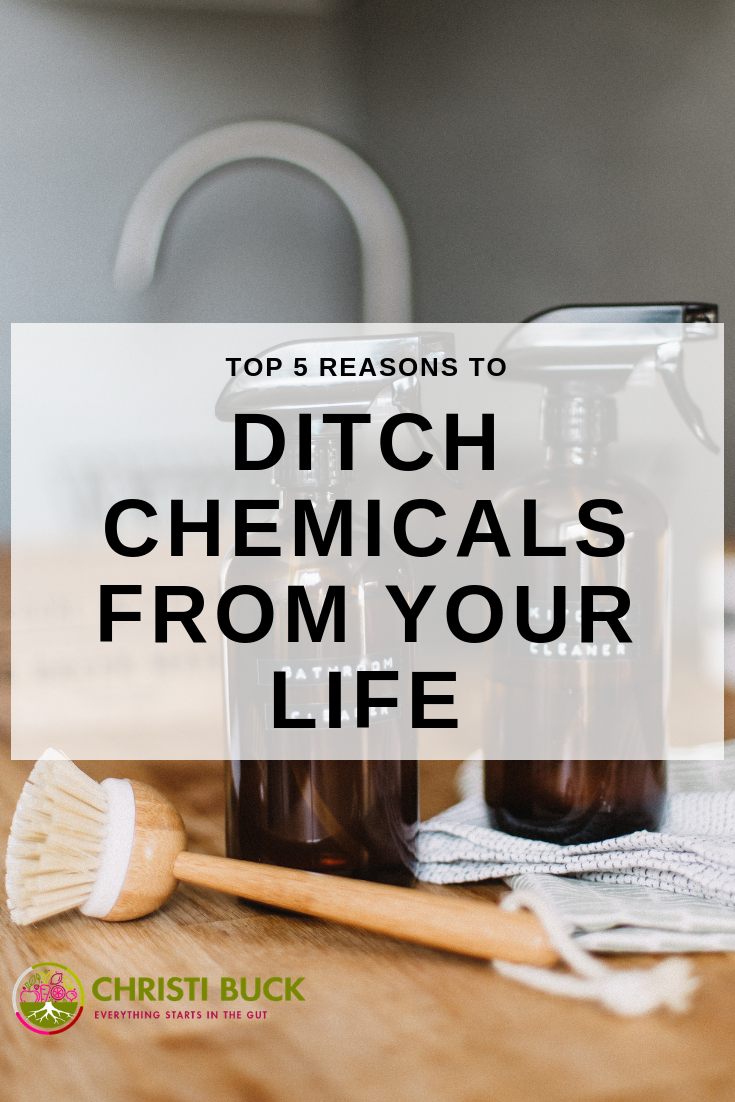Have you ever picked up a bottle of your tried-and-true household cleaner or personal care product and looked at the label? Take a moment and go take a look. You might be surprised to find a laundry list of sketchy chemicals and other ingredients. These toxins can cause tons of problems in the body ranging from allergies all the way to cancer.
Below are the top 5 reasons (there are way more – trust me) to ditch chemicals from your life.
1. “Fragrances”
When was the last time you took a look at your personal care product’s label? Did you know that the cosmetics industry can put any chemical into a product’s “fragrance” without listing it on the ingredients list? The EWG explains it here:
When you see “fragrance” on a personal care product’s label, read it as “hidden chemicals.” A major loophole in FDA’s federal law lets manufacturers of products like shampoo, lotion, and body wash include nearly any ingredient in their products under the name “fragrance” without actually listing the chemical.
Companies that manufacture personal care products are required by law to list the ingredients they use, but fragrances and trade-secret formulas are exempt.
Two of the most common toxins found in “fragrances” are parabens and phthalates.
- Parabens are a group of substances that act as a preservative in personal care products, pharmaceuticals, and food. Science shows that there are major concerns regarding their endocrine disrupting potential as well as a possible link to breast cancer.
- Phthalates are another group of chemicals used in plastics, solvents, and synthetic fragrances. Like parabens, phthalates are an endocrine disruptor. Phthalates are linked to reproductive issues.
2. Formaldehyde
Formaldehyde, a known human carcinogen, has been identified to cause cancer. It’s also associated with asthma/respiratory issues as well as skin allergies and irritation. In other words, you don’t want this chemical in your home!
You can find formaldehyde in products like grease cutters, laundry detergents, dish soaps, wood cleaners, and multi-surface cleaners.
3. Chlorine Bleach and Ammonia
When ammonia enters the body (via breathing, swallowing or skin contact) it reacts with water to produce ammonium hydroxide, which is very corrosive and damages cells in the body on contact. The fumes that come from ammonia-containing cleaners can also cause respiratory irritation. You can most commonly find ammonia in products like polishing agents and glass cleaner.
Beware! Don’t ever mix bleach with ammonia. When these two chemicals are combined, toxic gases called chloramines are produced. Exposure to chloramine gases can cause a variety of symptoms:
- Coughing
- Nausea
- Shortness of breath
- Watery eyes
- Chest pain
- Irritation to the eyes, nose, and throat
- Wheezing
- Pneumonia and fluid in the lungs
4. Perchloroethylene aka “PERC”
Perchloroethylene (PERC) is a solvent used as a dry cleaning fluid by approximately 28,000 U.S. dry cleaners according to the EPA. PERC often makes its way into household products such as water repellents, spot removers, wood cleaners, adhesives and silicone lubricants. Like many other household chemicals, PERC is also listed as causing cancer, can be harmful to the nervous and reproductive systems, and may impact fetal development during pregnancy.
5. Triclosan
According to the EWG, Triclosan, a powerful pesticide can cause negative changes in the human hormone system – ultimately harming reproduction and development. Likewise, higher triclosan levels in people are associated with increased sensitivity to allergens.
You can typically find triclosan in soaps, shampoos, conditioners, lotions, toothpastes, deodorants, and shaving products.
EWG and the scientists who signed the statement believe antimicrobials should only be used if adequate testing shows that they are safe and they have been proven effective for particular uses. Scientists are concerned that widespread use of antimicrobials in consumer products could contribute to growing antibiotic resistance and make the vital medical uses of antimicrobials ineffective.
What do you do next?
Need a little help ditching these toxins? Not sure what to do next or how to replace the cleaners and products you’ve grown to know and trust?
Ditch Common Chemicals and Switch to Young Living
Let me help you ditch your chemical-filled products and switch to all natural alternatives! Essential oils are a part of a plant’s immune system and they are responsible for some really important functions within plants:
- Transport nutrients and remove toxins (just like blood)
- Clean the cells of the organism
- Rewrite cellular DNA
- Repair damage
- Support normal physiology
I work with Young Living because it is the gold standard of purity in the world of essential oils. Young Living never adulterates or manipulates their essential oils. They also grow in better than organic conditions and are harvested on-site under very strict conditions to insure maximum therapeutic value. Even better, they have an open door policy at the farms that they own and operate.
If you are interested in working together, you can reach out to me here.


